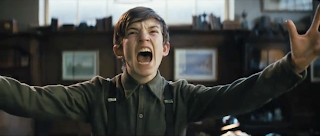**1/2 out of ****
Directed by: Matthew Vaughn
Starring: Michael Fassbender, James McAvoy, Jennifer Lawrence, Rose Byrne and Kevin Bacon
Running time: 132 minutes

Director Matthew Vaughn probably really wants to direct a James Bond film. He likely adores ultra-violent vigilante fare and may also be an enthusiast of 20th century American history. These predictions all spawn from the end result of his latest film, the long-anticipated origin story about the superhuman clan known as the X-Men.
Vaughn’s X-Men: First Class, despite its ambitious approach and strong performances, seems like four good ideas that never quite gel together. It’s a prequel that’s often exciting yet overwrought, and chock full of good ideas but often calculating in the method in which they are communicated, as if their purpose were to jumpstart a franchise rather than tell a story.
The first of the four concepts, as audiences expect, is the introductory tales of the Marvel comic-book characters that have cemented themselves on screen since 2000. We meet a younger Charles Xavier (James McAvoy), who is working with the CIA to recruit a crew of mutants to stop a ruthlessly power-hungry scientist, Sebastian Shaw (Kevin Bacon), during the Cold War era.

This crew includes the shapeshifting Raven/Mystique (Jennifer Lawrence), sonic screamer Sean Cassidy/Banshee (Caleb Landry Jones) and the ultra-powerful Dr. Hank McCoy/Beast (Nicholas Hoult), among others.
The middle section of the film, where Xavier rounds up his crew in a swift montage (akin to Ocean’s 11), the young gang connect with and improve their abilities (in another quickly paced montage) and form a steady alliance is fun, engaging, and briskly handled by Vaughn and Co. Unlike the prior films from the franchise that put the mutants' abilities ahead of the mutants, it’s refreshing to see an installment that manages to develop the characters as they hone their powers.

The second idea Vaughn (and his screenwriting team) develop is stylistic, following the guidelines of a globe-trotting 007 flick, complete with a lavishly designed ‘Swinging Sixties’ repertoire, a retro-animated credits sequence and enough air miles to disorient George Clooney's character from Up in the Air. Oh, and some of the visual effects seem unfinished, although I don’t think that was an homage to the early days of the Bond franchise.
As welcome as these artistic flourishes are, the leaden villains played by Bacon and the icy (literally) January Jones, undoubtedly similar to other world-domination-seeking Bond types, are maddeningly cheesy. Both actors are utterly wasteful, usually sneering in delight but without any other identifiable personalities that would articulate a multi-dimensional character.

The third idea pursued in the film is its chronological structure: here, we have an alternate history drama. X-Men: First Class places the characters within notable moments in recent history, beginning during the Holocaust (recycling the opening scene from the first X-Men film) and ending at a standoff during the Cuban Missile Crisis. By outlining the story through these historical frameworks, the stakes are high and there is a sense of place—although a surprise cameo from a notable screen X-Men doesn't fit the timeline.
While X-Men: First Class gets a passing grade for many of its efforts so far, the final attempted idea is a mishandled failure. It involves the character of Magneto. A Magneto spin-off (a la X-Men Origins: Wolverine) was in the works but later scrapped and his tale squeezed into Vaughn’s film; unfortunately, there’s very little juice to his story despite a terrific turn by Michael Fassbender.

Born Erik Lehnsherr, the mutant who becomes Magneto sees Shaw murder his mother and is dead-set on revenge for the rest of the film’s duration. While these qualities are a key part of the character, it is all we learn about him. The rest is sadly skimmed over and doesn't develop organically. One aspect that is given the shove is Erik’s friendship with Xavier, a major component of the later films (where they were portrayed by Ian McKellen and Patrick Stewart).
Fassbender is magnetic in the part, although his accent wavers to such an extent that we do not know the phonetic source. But with very little to do, he doesn’t make much of a mark. When the climax comes and the character makes a life-altering decision, we don’t know enough about him to be convinced that what he is doing is reasonable, and is thus unconvincing. Fassbender’s turn is representative of much of X-Men: First Class: absorbing, but its tone is all over the place.

No comments:
Post a Comment